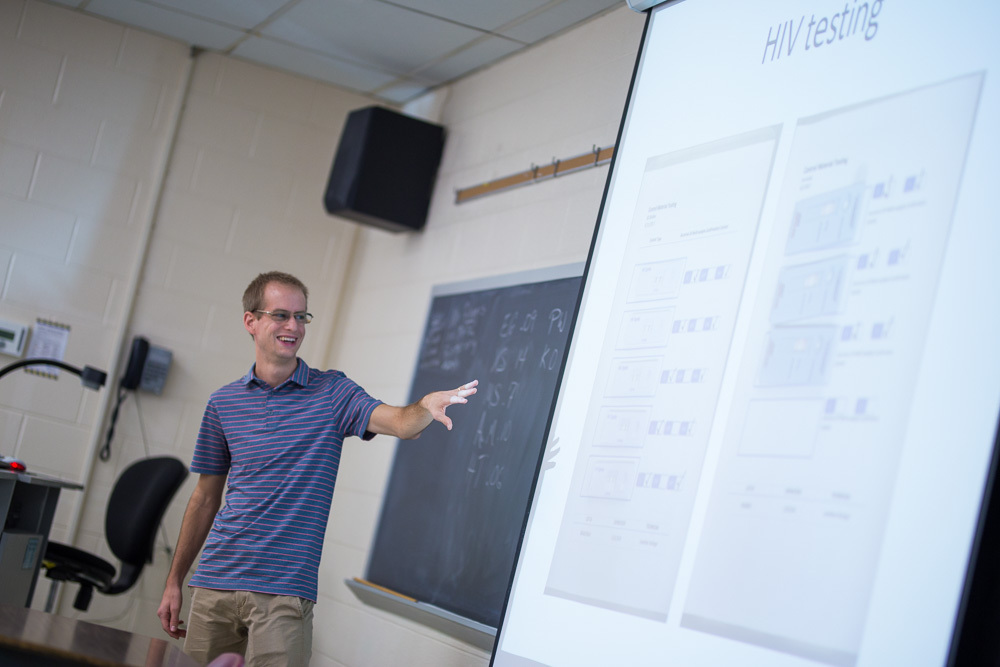Imagine a scientist working in a lab, and you might envision gleaming, sterile equipment in a strictly controlled environment. For one Eastern Mennonite University graduate now studying effects of Ebola Virus Disease (EVD) in Liberia, keeping samples in a four-degree window for days on end while navigating obstacles like electrical fires and limited infrastructure requires a “flexible way of thinking.”
Jonathan Nofziger manages the daily operation of clinical laboratories at several locations that are part of the Partnership for Research on Ebola Virus in Liberia, which is looking at long-term health effects of EVD in survivors. In that role, Nofziger supervises laboratory technicians collecting and processing samples, operates and performs detailed troubleshooting and maintenance on laboratory equipment, and maintains computer and networking systems used in the lab.
Maybe it’s no surprise that Nofziger was a biochemistry major at EMU and has a masters in public health from George Washington University. But he points to something else on his resume, too, that prepared him for his current role as research associate in Liberia for Advanced BioMedical Laboratories LLC: the liberal arts variety of his education, specifically theater.
“A major reason I got this job was actually because of my electrical skills that I gained while working at theater at EMU,” he said recently. “Without that I might not have gotten the job – or at least I would be struggling to do the work I need to get done.”
Managing laboratories in Liberia is no small challenge
Nofziger’s job includes doing anything required to keep labs functioning and projects running smoothly – no small feat, considering that the obstacles can appear insurmountable. Occasionally he asks himself, “If I had a normal job, would I be bored?”
Testing equipment and maintaining samples require constant, stable electricity, but the local grid is less than adequate, necessitating generators and extension cords to keep freezers powered so that blood samples can be kept at -80 degrees celsius. Washed-out roads in a climate with a six-month rainy season impede travel. The constant battle against dirt, humidity, and protracted supply chain timelines – which can take months – requires spending hours every day making sure equipment is fully functional and ready for running tests.

A recent litany of electrical fires happened when building renovators incorrectly reconnected wires, sending way too much electricity into the system so that when the breaker was turned back on, it “exploded.” Later an upper-story water leak destroyed the hospital wing’s electrical system. Getting off the grid and onto generator power is a pressing need, he said.
A key benefit of one of his machines in particular, he said, is its “thorough troubleshooting manual.”
Making an impact on public health
Such work requires broader training than just being taught a specific skill set.
“EMU provided the direct mentorship with professors to encourage that kind of thinking, but also the hands-on skills I use every day,” he said. “A liberal arts education prepared me for the job that was available without limiting me to only the job I was trained to do.”
Although his research focuses on EVD survivors – the 2014 EVD outbreak in Liberia has been declared ended by the World Health Organization – Nofziger knows the disease could reappear.
During a recent presentation to an EMU biology classes, Nofziger said that he finds it exciting to be part of research that he knows is going to have an impact in a country comparable in size to Virginia that suffered nearly 5,000 deaths in nearly 11,000 cases during the 2014 EVD outbreak.
“Three years ago there was no effective treatment and no vaccines for ebola,” he said. “It really is amazing what happens when the world gets together and decides to solve a problem. I’m glad to contribute to that effort.”
This article was first published in the Fall/Winter 2017 edition of Crossroads.
